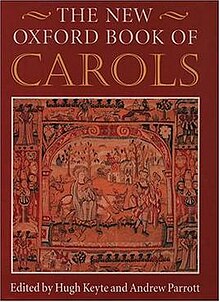
A Christmas carol is a carol on the theme of Christmas, traditionally sung at Christmas itself or during the surrounding Christmas holiday season. The term noel has sometimes been used, especially for carols of French origin. Christmas carols may be regarded as a subset of the broader category of Christmas music.
A carol is a festive song, generally religious but not necessarily connected with church worship, and sometime accompanied by a dance. A caroller is someone who sings carols, and is said to be carolling.
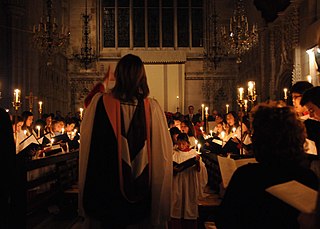
Nine Lessons and Carols, also known as the Festival of Nine Lessons and Carols and Service of Nine Lessons and Carols, is a service of Christian worship traditionally celebrated on or near Christmas Eve. The story of the fall of humanity, the promise of the Messiah, and the birth of Jesus is told in nine short Bible readings or lessons from Genesis, the prophetic books and the Gospels, interspersed with the singing of Christmas carols, hymns and choir anthems.
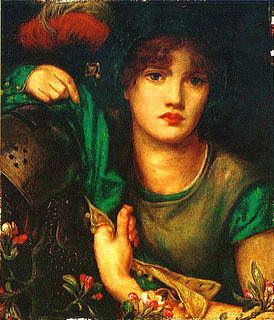
"Greensleeves" is a traditional English folk song. A broadside ballad by the name "A Newe Northen Dittye of ye Ladye Greene Sleves" was registered by Richard Jones at the London Stationer's Company in September 1580, and the tune is found in several late-16th-century and early-17th-century sources, such as Ballet's MS Lute Book and Het Luitboek van Thysius, as well as various manuscripts preserved in the Seeley Historical Library in the University of Cambridge.

Anglican church music is music that is written for Christian worship in Anglican religious services, forming part of the liturgy. It mostly consists of pieces written to be sung by a church choir, which may sing a cappella or accompanied by an organ.
"The First Nowell", also known as "The First Noel ", is a traditional English Christmas carol with Cornish origins, most likely from the early modern period, although possibly earlier. It is listed as number 682 in the Roud Folk Song Index.
Herbert Whitton Sumsion CBE was an English musician who was organist of Gloucester Cathedral from 1928 to 1967. Through his leadership role with the Three Choirs Festival, Sumsion maintained close associations with major figures in England's 20th-century musical renaissance, including Edward Elgar, Herbert Howells, Gerald Finzi, and Ralph Vaughan Williams. Although Sumsion is known primarily as a cathedral musician, his professional career spanned more than 60 years and encompassed composing, conducting, performing, accompanying, and teaching. His compositions include works for choir and organ, as well as lesser-known chamber and orchestral works.
"We Wish You a Merry Christmas" is an English Christmas carol, listed as numbers 230 and 9681 in the Roud Folk Song Index. The famous version of the carol is from the English West Country.
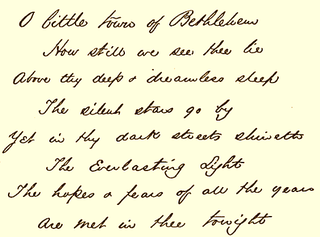
"O Little Town of Bethlehem" is a Christmas carol. Based on an 1868 text written by Phillips Brooks, the carol is popular on both sides of the Atlantic, but to different tunes: in North America to "St. Louis" by Brooks' collaborator, Lewis Redner; and in the United Kingdom and Ireland to "Forest Green", a tune collected by Ralph Vaughan Williams and first published in the 1906 English Hymnal.

Carols for Choirs is a collection of choral scores, predominantly of Christmas carols and hymns, first published in 1961 by Oxford University Press. It was edited by Sir David Willcocks and Reginald Jacques, and is a widely used source of carols in the British Anglican tradition and among British choral societies. A second volume was published in 1970, edited by David Willcocks and John Rutter, and the collection is now available in five volumes. A compendium edition was published later. In addition to music for Christmas, the collection also offers works that are suitable for other Christian festivals such as Advent and Epiphany.
The "Sussex Carol" is a Christmas carol popular in Britain, sometimes referred to by its first line "On Christmas night all Christians sing". Its words were first published by Luke Wadding, a 17th-century Irish bishop, in a work called Small Garland of Pious and Godly Songs (1684). It is unclear whether Wadding wrote the song or was recording an earlier composition.

The Oxford Book of Carols is a collection of vocal scores of Christmas carols and carols of other seasons. It was first published in 1928 by Oxford University Press and was edited by Percy Dearmer, Martin Shaw and Ralph Vaughan Williams. It became a widely used source of carols among choirs and church congregations in Britain.

Reginald Owen Morris, known professionally and by his friends by his initials, as R.O. Morris, was a British composer and teacher.
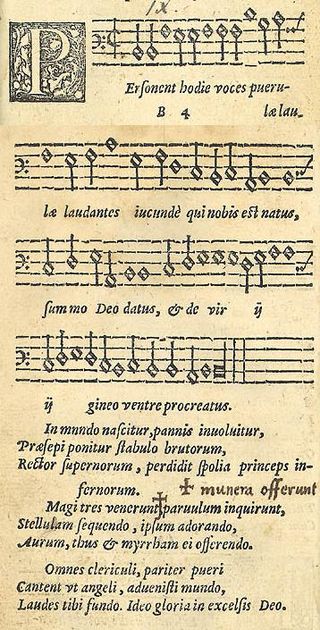
"Personent hodie" is a Christmas carol originally published in the 1582 Finnish song book Piae Cantiones, a volume of 74 Medieval songs with Latin texts collected by Jacobus Finno, a Swedish Lutheran cleric, and published by T.P. Rutha. The song book had its origins in the libraries of cathedral song schools, whose repertory had strong links with medieval Prague, where clerical students from Finland and Sweden had studied for generations. A melody found in a 1360 manuscript from the nearby Bavarian city of Moosburg in Germany is highly similar, and it is from this manuscript that the song is usually dated.
Hubert James Foss was an English pianist, composer, and first Musical Editor (1923–1941) for Oxford University Press (OUP) at Amen House in London. His work at the Press was a major factor in promoting music and musicians in England between the world wars, most notably Ralph Vaughan Williams, through publishing and encouraging performance of their works. In doing this work, he made the Music Department of OUP a major publisher of music in the early- and mid-twentieth century.
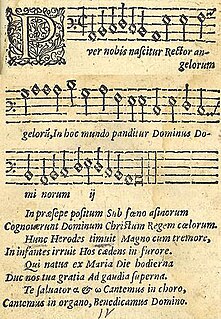
"Puer nobis nascitur", usually translated as "Unto Us Is Born a Son", is a medieval Christmas carol found in a number of manuscript sources—the 14th-century German Moosburg Gradual and a 15th-century Trier manuscript. The Moosburg Gradual itself contained a number of melodies derived from the 12th- and 13th-century organum repertories of Notre Dame de Paris and the Abbey of Saint Martial, Limoges, suggesting that its antiquity may be much greater.
"The Rocking Carol", also known as "Little Jesus, Sweetly Sleep" and "Rocking", is an English Christmas carol by Percy Dearmer. It was translated from Czech in 1928 and is performed as a lullaby to the baby Jesus.
The Gloucestershire Wassail, also known as "Wassail! Wassail! All Over the Town", "The Wassailing Bowl" and "Wassail Song" is an English Christmas carol from the county of Gloucestershire in England, dating back to at least the 18th century, but may be older.

"This Have I Done for My True Love", or "Tomorrow Shall Be My Dancing Day", Op. 34, no. 1 [H128], is a motet or part song composed in 1916 by Gustav Holst. The words are taken from an ancient carol, and the music is so strongly influenced by English folk music that it has sometimes been mistaken for a traditional folk song itself. It has often been described as a small masterpiece.
